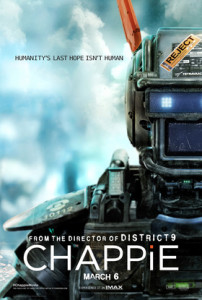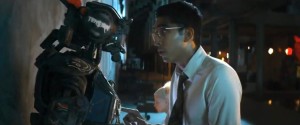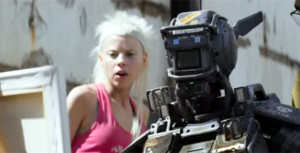 Neill Blomkamp certainly blew me away with his first directorial effort, 2009’s Sci-Fi smash District 9. Boasting some incredible CGI aliens, as well as a breakout performance by fellow South African Sharlto Copley, it hit all the right Sci-Fi notes and left us wanting more (heck, there were so many rumors of a second movie it seemed to be coming true by sheer force of collective will). Thoughtful, engaging, imaginative, and downright awesome; Blomkamp was destined for the new Sci-Fi/Fantasy Mount Rushmore with Christopher Nolan.
Neill Blomkamp certainly blew me away with his first directorial effort, 2009’s Sci-Fi smash District 9. Boasting some incredible CGI aliens, as well as a breakout performance by fellow South African Sharlto Copley, it hit all the right Sci-Fi notes and left us wanting more (heck, there were so many rumors of a second movie it seemed to be coming true by sheer force of collective will). Thoughtful, engaging, imaginative, and downright awesome; Blomkamp was destined for the new Sci-Fi/Fantasy Mount Rushmore with Christopher Nolan.
Sadly, his last two projects have fallen well short of the mark, with Chappie being a jumbled reprise of 2013’s Elysium. Based in part on Blomkamp’s short film Tertra Vaal, Chappie takes place in the near future (2016) in Johannesburg, South Africa. The city has been enveloped by crime and with the assistance of weapons corporation Tetravaal (sound familiar?), they have instituted the first robotic police to help control crime. The man who designed the robots, Deon Wilson (Dev Patel), has been working to develop these robots to be human-like by giving them consciousness and emotions as a follow up to his previous work. When the ideas he presents are shot down by his boss (Sigourney Weaver), he steals a robot that is about to be destroyed and reprograms it. This is done after he has been kidnapped by a group of criminals (Ninja and Yo-Landi Visser of Die Antwoord, Jose Pablo Cantillo) looking to get their hands on a robot to pull off a heist. Chappie (as he is named by Yolandi) is born and begins to assimilate and learn from humanity from Deon, his maker, and from Ninja and Yolandi, who he calls his Daddy and Mommy. Unfortunately, I haven’t even begun to touch the plot, which also involves weapons designer Vincent Moore (Hugh Jackman) and crazy criminal kingpin Hippo (Brandon Aurest). There is way too much going on in this movie and it would involve a lot more explanation than I am willing to devote a column to.
 The biggest weakness of this movie might be the unrealized potential of its disparate story elements. Patel’s character, Deon, is set on progressing humanity to its next evolutionary step by giving these robots real artificial intelligence that is superior to humans. However, while Deon desires to extend human life and further enrich the humanities and advance science, his boss, Moore, and the criminals are only looking at what will advance their self-centered ambitions. This story element is a football that is fumbled and recovered throughout the movie only to be lost for a good portion and then reappear like a cinematic “Fumblerooski” (if you don’t know what that is, Google it and you’ll get what I mean).
The biggest weakness of this movie might be the unrealized potential of its disparate story elements. Patel’s character, Deon, is set on progressing humanity to its next evolutionary step by giving these robots real artificial intelligence that is superior to humans. However, while Deon desires to extend human life and further enrich the humanities and advance science, his boss, Moore, and the criminals are only looking at what will advance their self-centered ambitions. This story element is a football that is fumbled and recovered throughout the movie only to be lost for a good portion and then reappear like a cinematic “Fumblerooski” (if you don’t know what that is, Google it and you’ll get what I mean).
Likewise, there is a very pregnant parable that makes the 2nd third of the film by far the best and most intriguing portion of the movie. Chappie has been made by Deon, who he refers to as his Maker, to be human-like and in his infant-like state begins to learn words, phrases, and how to act in the larger world. There is a strong echo of the human and the spiritual in how Chappie is quickly raised from infant to fully functioning robot. Deon gives him directives that he calls promises that Chappie cannot break, like not killing humans or doing crimes. Like God decreeing the law and commandments to the Israelites on Mount Sinai, “The Maker” gives Chappie laws to live by that shape how he interacts with the world and shows that being born/programmed human means being grounded to a moral anchor. When that anchor becomes unmoored through contrary promises, like in the garden, Chappie is corrupted and he is able to get around these “laws” to further his the selfish purposes of his Mommy and Daddy and his own desires. It is unfortunate that this rich vein of story is abandoned in favor of a confusing and bombastic conclusion.
 The final third could almost be forgiven if the whole movie hadn’t been tonally haywire. Chappie, like the titular robot, is a tonal and stylistic mishmash of previous robot Sci-Fi classics Short Circuit and RoboCop. However, it is neither funny nor satirical and is as limp as a rubber chicken. There were so many great ideas, and some thought-provoking portions, but with all the praiseworthy thought that might have went into what a future might look like where we can download our consciousness into a thumb drive or into a robot, Blomkamp sprayed stories like bullets and missed the mark. The conversations it starts might honestly be more interesting than this movie and I am convinced a cinematic progeny of this movie is bound to come around someday.
The final third could almost be forgiven if the whole movie hadn’t been tonally haywire. Chappie, like the titular robot, is a tonal and stylistic mishmash of previous robot Sci-Fi classics Short Circuit and RoboCop. However, it is neither funny nor satirical and is as limp as a rubber chicken. There were so many great ideas, and some thought-provoking portions, but with all the praiseworthy thought that might have went into what a future might look like where we can download our consciousness into a thumb drive or into a robot, Blomkamp sprayed stories like bullets and missed the mark. The conversations it starts might honestly be more interesting than this movie and I am convinced a cinematic progeny of this movie is bound to come around someday.


1 comment